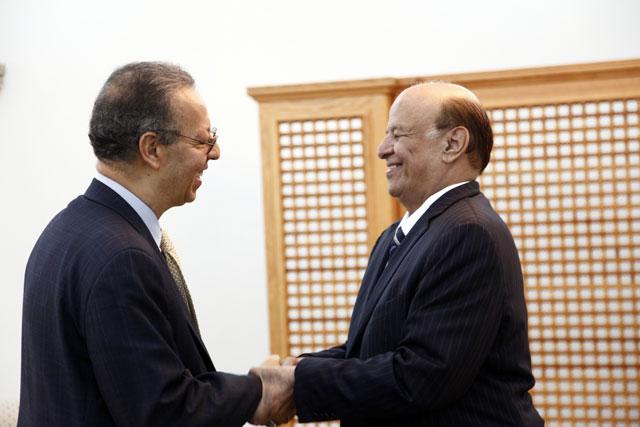You are here
Yemen leader meets UN envoy in southern refuge Aden
By AFP - Feb 26,2015 - Last updated at Feb 26,2015

ADEN — Yemen's President Abed Rabbo Mansour Hadi met Thursday with the UN envoy in Aden, as the southern city increasingly became the country's de facto political and diplomatic capital instead of militia-held Sanaa.
Saudi Arabia also announced its envoy was resuming his duties in Aden, after several Arab and Western nations closed their embassies in Sanaa this month over security fears.
Hadi held his first face-to-face talks with UN envoy Jamal Benomar in Aden after fleeing on Saturday to the city in Yemen's formerly independent south, an AFP correspondent said.
Hadi has called for the government to rally in Aden, after he escaped house arrest under a Shiite militia, known as Houthis, who have seized control of Sanaa.
Benomar told reporters after the talks that he hoped Hadi's "resumption of duties would help to pull Yemen out of its crisis".
He said the two had discussed the "abnormal situation in Yemen and peaceful ways to end it" and that he was looking into options for a "safe place" to resume political talks.
The envoy landed a day after a high-profile delegation visited Aden to reiterate support from Arab Gulf monarchies to Hadi.
Benomar has been shuttling between Yemeni parties to secure an end to the country's political deadlock.
The UN diplomat also held talks Thursday with representatives of political factions from the Southern Movement, which is calling for the secession of the regions of the formerly independent south.
Hadi has been seeking to restore his authority from Aden and earlier this week received representatives of Yemen's main seven political parties.
'Centre of gravity' shifting
Also backed by the United Nations and Western allies as Yemen's legitimate ruler, Hadi has retracted a resignation he offered last month and resumed his duties.
He has said he hopes to make Aden secure for the return of foreign diplomatic missions, after many countries including the United States, Britain, France, Saudi Arabia, Turkey and the United Arab Emirates shuttered their embassies.
In a first step, the Saudi embassy to Yemen said in a statement Thursday that its ambassador, Mohammed Saeed al-Jaber, had resumed his duties from the kingdom's consulate in Aden.
"The centre of political and diplomatic gravity has shifted to Aden after Hadi went there and following the popular support he received in southern and central provinces," Yemeni political analyst Thabit Hussein said.
"Aden now has a special importance due to the political and security situation in Sanaa."
Powerful tribes in the oil-rich province of Marib, east of Sanaa, have urged Hadi to declare Aden, which was the capital of South Yemen, the "temporary capital of Yemen until Sanaa is liberated”.
The Houthis, who have long clashed with central authorities, descended from their power base in northern Yemen to seize Sanaa in September.
After their attempts to expand into southern and central Yemen were checked by fierce resistance from Al Qaeda and from Sunni tribesmen, the militia moved to take power this month in what Yemen's Gulf neighbours branded a coup.
The country's continued insecurity was highlighted this week when a French woman — 30-year-old Isabelle Prime — and her Yemeni interpreter were kidnapped on the streets of Sanaa by unidentified gunmen.
Prime's father Jean-Noel on Thursday urged her kidnappers "to show their humanity" and set her free.
Related Articles
Yemen's embattled President Abed Rabbo Mansour Hadi pledged Saturday to fight Iran's influence in his violence-wracked country, accusing the Shiite Houthi militia of importing Tehran's ideology.
Forces loyal to Yemen's president said they had seized strategic buildings in the southern city of Aden on Monday after a five-hour battle, escalating a civil conflict threatening to split the country in two.
Yemeni President Abed Rabbo Mansour Hadi called Tuesday for troubled UN-brokered reconciliation talks to be moved to neighbouring Saudi Arabia if agreement cannot be reached on a venue inside Yemen.

















